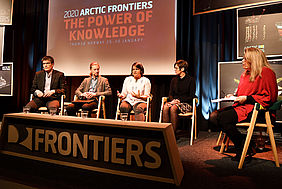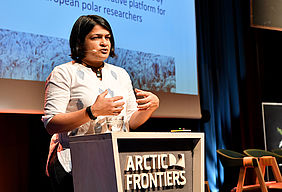The EPB was invited to provide a Plenary lecture at Arctic Frontiers 2020 in Tromsø. Executive Secretary, Renuka Badhe, gave the talk titled 'European Polar Board - At the confluence of science and policy in the polar regions'. The lecture formed part of the series of events to mark the EPB's 25th Anniversary in 2020.
The theme of Arctic Frontiers 2020 was 'The Power of Knowledge'. Knowledge is essential for people living and operating in the Arctic. As scientific knowledge has expanded and become widely available, it plays a central role in our stewardship of the region. Arctic countries, communities and businesses aspire to have knowledge-driven policies and strategies to guide the sustainable development of the Arctic. At Arctic Frontiers 2020, knowledge – our most valuable resource – was in focus, particularly via Theme 2: Knowledge-based development in the Arctic. Scientific knowledge is considered to be a critical component of decision-making in addressing fundamental challenges such as climate change and sustainable development, in the Arctic as well as other parts of the world. Science can provide information and insights into the nature of current and future changes in biophysical and social systems, contribute to the generation of new and innovative policies and technologies, and facilitate the evaluation and assessment of plans and policies.
Video recordings of the plenary presentation and subsequent panel discussion can be viewed here https://youtu.be/4nnBoR5gMEw and here https://youtu.be/D5tgtIqy_Q4 respectively.
A copy of the presentation slides can be viewed here.
Presentation abstract:
The European Arctic and Antarctic research community has long been a leader in cooperation across national and disciplinary boundaries. Throughout its 25-year history, the EPB has supported Europe’s leadership on polar issues, working at the interface between research and policy across the widest variety of disciplines and issues.
Organisations such as the EPB are effective due to the world-leading expertise of their Members, which when collated enable a strong, internationally authoritative voice to be heard on pressing polar-related issues. Further, the unified voice of the European polar community can effectively draw attention to specific issues requiring a policy response. This multi-directional communication between research, policy and other stakeholders, which the EPB facilitates, is essential for successful science-policy interfacing.
The EPB has led or contributed to several activities in recent years that exemplify effective communication between science and policy, leading to tangible benefits for the Polar Regions and the people living or working there. The EPB-ESA project CHOICEe, hopes to improve working conditions for polar researchers, astronauts, and others living and working in the polar regions. The EPB Action Group on Infrastructure is looking at ways to improve accessibility and coordination of European polar research facilities. The EPB Action Group on Environmental Impacts of Polar Research and Logistics, develops best practices to minimise the negative impacts of research on polar environments. The EU-PolarNet White Paper process, co-identifying pressing research needs and policy questions with polar researchers, communities, policymakers and other stakeholders. EPB’s work with the EU-PolarNet on Stakeholder Engagement in Polar Research, with continuing development of best practices for interaction with stakeholders in the polar regions.
The EPB is celebrating its 25th Anniversary throughout 2020, looking back at its successful history and looking ahead to the next 25 years at the confluence of science and policy in the Polar Regions.


